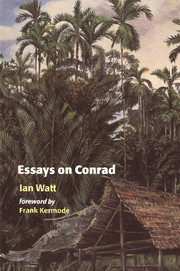Book contents
- Frontmatter
- Contents
- Foreword
- Acknowledgements
- Chapter 1 Joseph Conrad: alienation and commitment
- Chapter 2 Almayer's Folly: introduction
- Chapter 3 Conrad criticism and The Nigger of the ‘Narcissus’
- Chapter 4 Conrad's Heart of Darkness and the critics
- Chapter 5 Comedy and humour in Typhoon
- Chapter 6 The political and social background of The Secret Agent
- Chapter 7 ‘The Secret Sharer’: introduction
- Chapter 8 Conrad, James and Chance
- Chapter 9 Story and idea in Conrad's The Shadow-Line
- Chapter 10 The decline of the decline: notes on Conrad's reputation
- Chapter 11 Around Conrad's grave in the Canterbury cemetery – a retrospect
- Chapter 12 ‘The Bridge over the River Kwai’ as myth
- Index
Chapter 5 - Comedy and humour in Typhoon
Published online by Cambridge University Press: 22 September 2009
- Frontmatter
- Contents
- Foreword
- Acknowledgements
- Chapter 1 Joseph Conrad: alienation and commitment
- Chapter 2 Almayer's Folly: introduction
- Chapter 3 Conrad criticism and The Nigger of the ‘Narcissus’
- Chapter 4 Conrad's Heart of Darkness and the critics
- Chapter 5 Comedy and humour in Typhoon
- Chapter 6 The political and social background of The Secret Agent
- Chapter 7 ‘The Secret Sharer’: introduction
- Chapter 8 Conrad, James and Chance
- Chapter 9 Story and idea in Conrad's The Shadow-Line
- Chapter 10 The decline of the decline: notes on Conrad's reputation
- Chapter 11 Around Conrad's grave in the Canterbury cemetery – a retrospect
- Chapter 12 ‘The Bridge over the River Kwai’ as myth
- Index
Summary
FOR some readers Typhoon is one of Conrad's great books. It was, for instance, the work which Ugo Mursia chose to translate into Italian, and thus initiate his publishing career as a Conradian in 1959; it was also, for F. R. Leavis, one of ‘Conrad's masterpieces’. Leavis doubted, however, that there was much general ‘recognition of just where the strength of Typhoon lies’; in Leavis's view, that strength ‘lies not so much in the demented fury’ of the typhoon itself, as in ‘the presentment of Captain MacWhirr, the chief mate Jukes and the chief engineer Solomon Rout’. Conrad's ‘particular effect of heroic sublimity’, Leavis went on, depends on the ordinariness of the characters, and it is this which gives a ‘supremely effective’ irony to the treatment of the storm, which remains, in his view, ‘the main theme of the tale’. I do not believe that typhoon is the ‘main theme’, or that ‘heroic sublimity’ is the particular effect, of Typhoon; while the ‘ordinariness’ of the characters, and of most of the narrative, seems to me to have a very different function: its primary aim is to achieve not the sublime but the comic and the humorous.
Here, I should perhaps explain that – without going into the issue fully – I do not intend any very specific distinction between comedy and humour. Comedy is an established literary genre, and I believe that Typhoon is structured in a way which is in some respects typical of stage comedy.
- Type
- Chapter
- Information
- Essays on Conrad , pp. 97 - 111Publisher: Cambridge University PressPrint publication year: 2000
- 1
- Cited by



